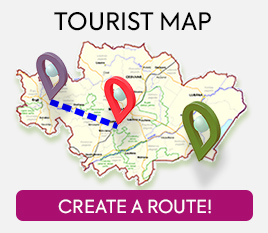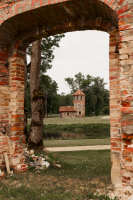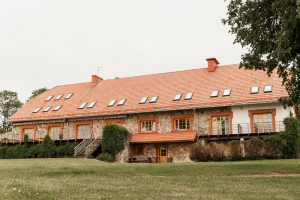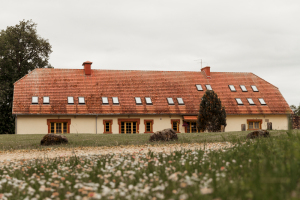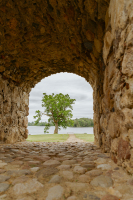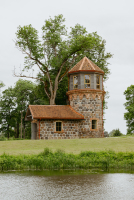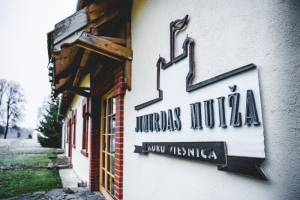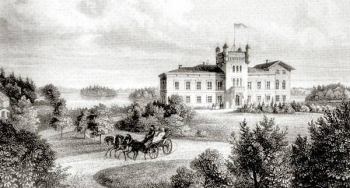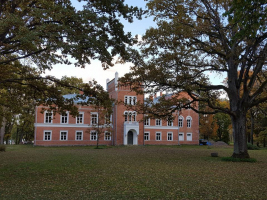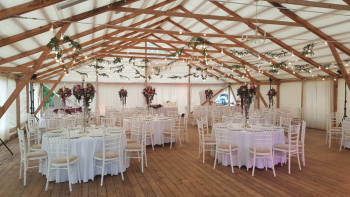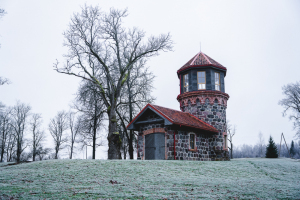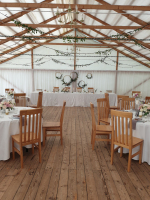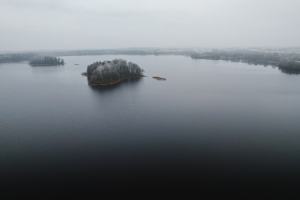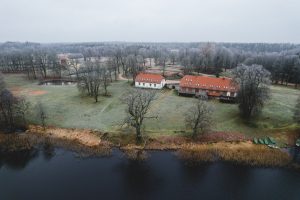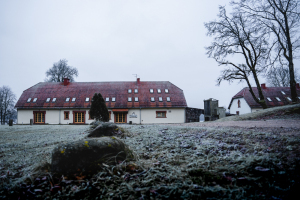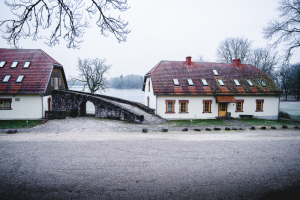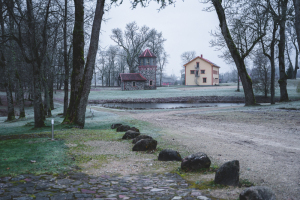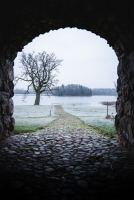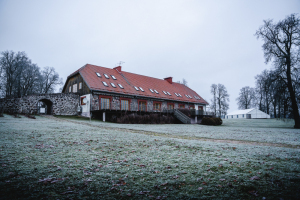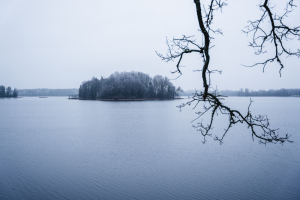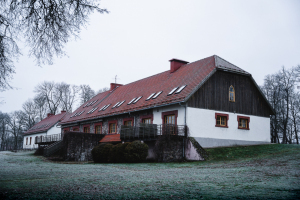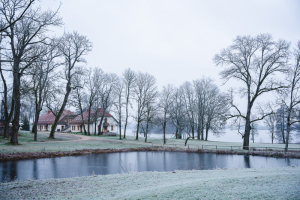Jumurda Manor, Lake Jumurdas, park, accommodation, Jumurda rural territory
The recreational complex “Jumurda manor” includes three buildings with separate rooms, a restaurant, terrace, conference room, spacious summer canopy, and sauna building with large banquet hall. The complex sits on 17 ha and also includes a rich park, sports ground and spots for swimming.
OFFER:
* Accommodation – 105 people (up to 180, with extra beds).
* Rooms for conferences and seminars (for up to 50 participants).
* Banquet hall (for up to 70 guests).
* For wedding and other occasions in summer, a canopy is available (for up to 150 guests).
* Catering must be arranged in advance.
* Sauna.
* Pool.
* Fireplace hall.
* Free private parking.
PRICES:
* Accommodation: EUR 25–40 per person;
* Pets are allowed, fee – EUR 10;
* The ground floor in sauna building (sauna and fireplace hall): EUR 300, sauna towels EUR 3 per towel;
* Summer canopy or banquet hall in the sauna building: EUR 600.
Note! We only work if arranged in advance and if the number of guests is at least 10.
ACTIVE LEISURE:
* Sports ground.
* Volleyball court.
* Football field.
* Playground.
* Boat rental.
HISTORY:
* The owner of Jumurda manor (Jummerdehn) was Reinhold von Tiesenhausen. In 1527, when his estate was divided, Jumurda and Vējava were transferred to his son who lived a long life and died as a soldier protecting Ērgļi against Ivan the Terrible’s army on 28 August 1577. Unfortunately, nothing remains in Jumurda from those times, but there is some evidence left from other owners – the von Transehe family.
* The lord’s house was built around 1856, when the manor was owned by Alvil von Transehe. Sadly, the author of the design is not known, but the construction work was directed by the Liv construction master Mārcis Sārums, who also built the church in Vecpiebalga. Jumurda manor is among the first castles following the architectural principles of historicism in Latvia. The main façade is contemplated with an entrance and a small balcony above it, from where the lord used to address his people on festive occasions.
* For some time, the forest guard and landlord at Jumurda manor was the well-known Latvian poet Andrejs Pumpurs. The manor was demolished in 1905, but was restored soon in 1907 when it became the property of the Latvian doctor Reinholds Miķelis Liepiņš, who also established the first pharmacy in this neighbourhood. After the World War I homeless people squatted the manor, but later the ground floor was used as a creamery. Since 1929, the local primary school was located in the manor house, but now it is under reconstruction.
* The exterior of the manor is now put in order, the former stable, servants’ house and gardener’s house have been turned into a hotel, the water tower – into an observation tower. One of the byres is now a sauna, but the beer cellar – an outhouse.
JUMURDA RURAL TERRITORY
Jumurda rural territory is located in the central part of Latvia — in Madona Municipality in Vidzeme Upland, and borders Cēsis Municipality. Distance to Madona is 36 km, and to Riga—113 km. Area: 131.1 km2. Population: 248 (data of 01.07.2024). The territory is crossed by the regional motor road P33 Ērgļi–Jaunpiebalga–Saliņkrogs and local motor roads V839 Lautere–Jumurda and V846 Vestiena–Vējava–Ineši.
There are several lakes in the territory: Lake Jumurdas (177 ha), Lake Pakšēnu (41.6 ha), Lake Vidus (17.8 ha) shine, and the River Valola (17 km) winds its way through. Lake Jumurdas and its surroundings (353 ha), and Palšu Bog (621 ha), which stretches over Jumurda and Kaive rural territories, have been included in the territory of nature reserve and Natura 2000 net. The highest hills: Bākūzis (272 m), Hill Egļu (267 m), Hill Laktas (250 m).
Cultural and historical heritage in the rural territory: Aizbetņu settlement, Aizbetņu ancient burial field, Dreimaņu ancient burial field, stone–cult place Sīļu badakmens, medieval fortification Cirstu redoubt, Vējava castle mound, Tjaku–Viesaku ancient burial field. State-protected historical monument Verst Pole. Architectural monument of local importance: farmstead “Kajēni”.
Jumurda manor, 1866. Gravure by W. S. Stavenhagen.
Jumurda rural territory was formed by merging Jumurda and Vējava rural territories. Jumurda manor was first mentioned in written sources in the 15th century. For many years, it was owned by von Tiesenhausen family, then von Transehe family bought the manor in 1852 and built the current manor house–castle. In 1929, local primary school was established in the former manor castle, and the school operated until 2000.
Jumurda manor house. Photo by Z. Saulīte.
Restoration of Jumurda manor complex was started in 2000 by creating a hotel, furbishing sauna building and a banquet hall, restoring “Viesturi” (“Zīļu”) house and the water tower and taking care of the splendid castle building. This place is now a recreational complex “Jumurda Manor”, which encompasses three buildings with rooms in them, a restaurant and a terrace, a conference hall, and sauna building with spacious banquet hall. The territory also offers a sports ground, and it is possible to rent out boats and bicycles, as well as to go fishing or simply take a walk.
Administration, lounge and guest house of the recreation complex “Jumurda Manor”. Photo by Z. Saulīte.
Vējava local council building, 1930s. Photo by V. Upītis.
Vējava manor was first mentioned in written sources in the 14th century, and its name is linked with von Tiesenhausen family. Starting from the 17th century, the manor changed hands several times until it was obtained by Johann Dzenne in 1871. Vējava manor had one of the very first manor gardens in Vidzeme. Unfortunately, the manor suffered much during the World War II. Luckily, the manor house partially survived, and Vējava school was established in it in 1947 and operated until 1964. Nowadays, majority of buildings are worn out and have crumbled.
Vējava school (former manor house), 1950s/1960s.
In Jumurda, there is a local community house with a library, healthcare office, public service centre. The companies operating in the territory: farms “Kajēni” and “Pietrēni” (dairy farming), farms “Indrāni”, “Upkalni”, and “Baltiņi” (beef farming), farm “Sniķeri” (goat farming and cheese production). The game farm “Viesakas” breeds wild animals and birds, as well as beef cattle. There is a licensed shooting range where sporting competitions are held. Car repair services are provided by the company “NX”.
Several creative personalities have been and are linked with Jumurda: poet Andrejs Pumpurs (Jumurda manor administrator from 1872 until 1874), writer Ilze Kalnāre, businessman and introducer of silk fabric manufacturing in Latvia Roberts Hiršs, artists the Graši family, the family of the plant breeder Pēteris Upītis, poet Jānis Sirmbārdis, actor Normunds Laizāns, watercolour painter Zigmunds Šņore.
View of Zīļu House and the restored water tower. Photo by Z. Saulīte.
Jumurda community house. Photo by Z. Saulīte.


